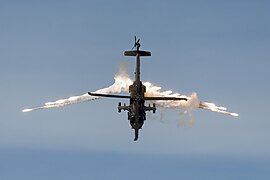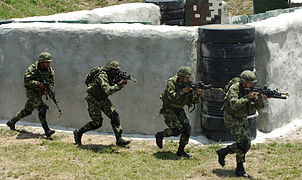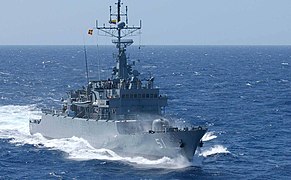| Military Forces of Colombia | |
|---|---|
| Fuerzas Militares de Colombia | |
 The tri-service badge | |
| Service branches | |
| Headquarters | Ministry of National Defense, Bogota D.C. |
| Leadership | |
| Commander-in-Chief | President Gustavo Petro |
| Minister of Defense | Iván Velásquez |
| General Commander | Major General Helder Fernan Giraldo |
| Personnel | |
| Military age | 18 |
| Conscription | 18 months (Army and Aerospace Force) 24 months (Navy) 12 Months (National Police) |
| Active personnel | 429 000 [1] |
| Reserve personnel | 998 000[1] |
| Expenditure | |
| Budget | US$10.7 billion (2023)[2] |
| Percent of GDP | 2.9% (2023)[2] |
| Industry | |
| Domestic suppliers | Indumil COTECMAR |
| Foreign suppliers | |
| Related articles | |
| History | Military history of Colombia |
| Ranks | Military ranks |
The Military Forces of Colombia (Spanish: Fuerzas Militares de Colombia) are the unified armed forces of the Republic of Colombia. They consist of the Colombian Army, the Colombian Navy and the Colombian Aerospace Force. The National Police of Colombia, although technically not part of the military, is controlled and administered by the Ministry of National Defence, and national conscription also includes service in the National Police, thus making it a de facto gendarmerie and a branch of the military. The President of Colombia is the military's commander in chief, and helps formulate defense policy through the Ministry of National Defence, which is in charge of day-to-day operations.
The Military Forces of Colombia have their roots in the Army of the Commoners (Ejército de los Comuneros), which was formed on 7 August 1819 – before the establishment of the present day Colombia – to meet the demands of the Revolutionary War against the Spanish Empire. After their triumph in the war, the Army of the Commoners disbanded, and the Congress of Angostura created the Gran Colombian Army to replace it, thus establishing the first military service branch of the country.
The Colombian military was operationally involved in World War II and was the only Latin American country to send troops to the Korean War. Ever since the advent of the Colombian Conflict, the Colombian military has been involved in combat, pacification, counter-insurgency, and drug interdiction operations all over the country's national territory. Recently it has participated in counter-piracy efforts in the Horn of Africa under Operation Ocean Shield and Operation Atlanta.
The military of Colombia is the third largest in the Western Hemisphere in terms of active personnel and has the fourth largest expenditure in the Americas, behind the United States Armed Forces, the Canadian Armed Forces and the Brazilian Armed Forces respectively.[3][4]
Services
[edit]The Colombian Constitution includes two overlapping definitions of what could be defined as 'armed forces' in English:
- The Public Force (La Fuerza Pública): Includes the Military Forces proper and the National Police (Title VII, chapter VII, Art. 216)
- The Military Forces (Las Fuerzas Militares): Includes only the 3 major military service branches: Army, Navy and Aerospace Force (Title VII, chapter VII, Art. 217)
This is a subtle yet important distinction, both in terms of emphasizing the civil nature of the National Police, but also adapting the national police to function as a paramilitary force which can perform military duties as a result of the Colombian Conflict. This has led to some of the most important police units adopting military training and conducting special operations alongside the Colombian Army, Aerospace Force, and Navy. Therefore, the functions of the Colombian Police in practical terms are similar to those of a gendarmerie, like the Spanish Civil Guard and the Carabineros de Chile, which maintain military ranks for all police personnel.
Personnel
[edit]The Colombian armed forces consist of:
Military Forces:
- Colombian Army
- Colombian Navy – and attached services Marines and Colombian Coast Guard
- Colombian Aerospace Force
And,
Public Force strength as of April 2014.[5]
| Force | Service | Officers | Total |
| Military | 10,094 | 246,325 | |
| Military | 2,481 | 33,824 | |
| Military | 2,679 | 13,928 | |
| Public | 6,924 | 176,557 | |
| Total | 22,178 | 470, 634 | |
Dependencies
[edit]- Military Medical Corps ('Sanidad Militar') – Medical and Nurse Corps
- Indumil (Industrias Militares – INDUMIL) – Military Industry Depot
- Military Sports Federation (Federación Deportiva Militar – FEDECODEMIL)
- Military Printing (Imprenta Militar)
- Military Museum (Museo Militar) – History of the Armed Forces of Colombia
- Superior War College (Escuela Superior de Guerra (Colombia) ESDEGUE)
Funding
[edit]In 2000, Colombia assigned 3.9% of its GDP to defense.[6] By 2008 this figure had risen to 4.8%, ranking it 14th in the world.[7] The armed forces number about 250,000 uniformed personnel: 145,000 military and 105,000 police. These figures do not include assistance personnel such as cooks, medics, mechanics, and so on. This makes the Colombian military one of the largest and most well-equipped in Latin America. Many Colombian military personnel have received military training assistance directly in Colombia and also in the United States. The United States has provided equipment and financing to the Colombian military and police through the military assistance program, foreign military sales, and the international narcotics control program, all currently united under the auspices of Plan Colombia.
World factbook statistics
[edit]- Military manpower – military service age and obligation: 18 years of age for compulsory and voluntary military service; conscript service obligation – 24 months (2004)
- Military manpower – availability:
- males age 18–49: 10,212,456
- females age 18–49: 10,561,562 (2005 estimate)
- Military manpower – fit for military service:
- males age 18–49: 6,986,228
- females age 18–49: 8,794,465 (2005 estimate)
- Military manpower – reaching military age annually:
- males age 18–49: 389,735
- females age 18–49: 383,146 (2005 estimate)
Rank Insignia
[edit]-
Colombian Aerospace Force Sikorsky UH-60L Arpía III (S-70A-41) just after having launched several flares.
-
Colombian Navy Frigate ARC Caldas
-
Colombian Special Forces soldiers
-
A vessel of the Colombian Navy
See also
[edit]- AFEUR
- Colombia
- Colombian Army
- Colombian military decorations
- Indumil
- Joint Task Force OMEGA
- Military ranks of the Colombian Armed Forces
References and notes
[edit]- ^ Includes 435 sub-officers Spanish: Suboficiales and 3,125 agents Spanish: Agentes
- ^ Includes 123,125 executive personnel Spanish: Nivel Ejecutivo and 23,562 Auxiliary conscript Spanish: Auxiliares
- ^ a b IISS 2018, pp. 397
- ^ a b Tian, Nan; Fleurant, Aude; Kuimova, Alexandra; Wezeman, Pieter D.; Wezeman, Siemon T. (28 April 2019). "Trends in World Military Expenditure, 2018" (PDF). Stockholm International Peace Research Institute. Archived (PDF) from the original on 2022-10-10. Retrieved 30 April 2019.
- ^ "Total Available Active Military Manpower by Country". Retrieved 2017-07-30.
- ^ "Defense Spending by Country". Retrieved 2017-07-30.
- ^ "Pie de fuerza aumentó en 42 mil efectivos - El Nuevo Siglo Bogotá". www.elnuevosiglo.com.co. Retrieved 2 April 2018.
- ^ "Cálculo del Gasto en Defensa y Seguridad – GDS" (PDF). Ministerio de Defensa Nacional. Ministerio de Defensa de Colombia. Retrieved 19 August 2016.
- ^ "Military expenditure (% of GDP)". The World Bank. The World Bank. Retrieved 19 August 2016.
External links
[edit]- Ministerio de Defensa de Colombia – Official Ministry of Defense site (in Spanish)
- Comando General de las Fuerzas Militares – Official Armed Forces General Command (in Spanish)
- Ejército Nacional de Colombia – Official Army site (in Spanish)
- Ejército Nacional de Colombia – Official Army site (in English)
- Armada Nacional de Colombia – Official Navy site ((in Spanish and English))
- Fuérza Aeroespacial Colombiana – Official Aerospace Force site (in Spanish)
- Policía Nacional de Colombia – Official National Police site (in Spanish)
- UNFFMM – Unofficial site of the Colombian Military Forces
Other Links
[edit]Bibliography
[edit]- International Institute for Strategic Studies (14 February 2018). The Military Balance 2018. London: Routledge. ISBN 9781857439557.





